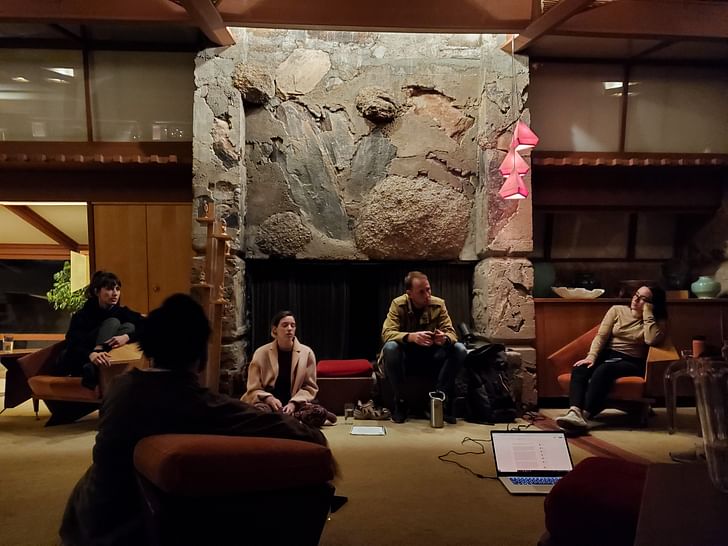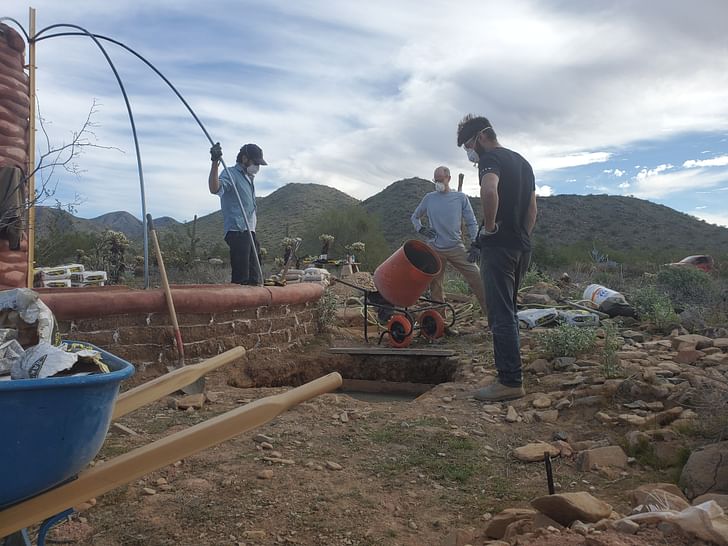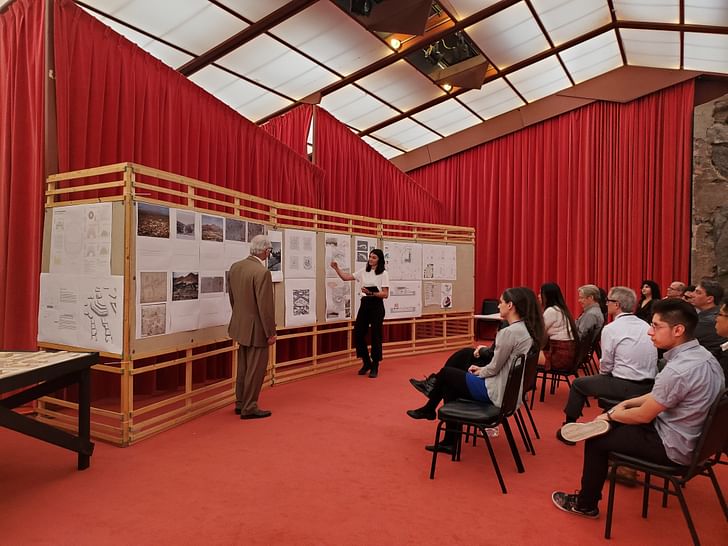

Continuing Archinect’s ongoing coverage of the closing of the School of Architecture at Taliesin (SoAT), Archinect spoke with a current first-year SoAT student, Alex Martinec. This interview comes in light of the recent letter from Frank Lloyd Wright Foundation’s CEO Stuart Graff outlining their decision to let the Foundation’s agreement of SoAT expire at the end of July 2020. The move by the Foundation cements the planned closure of the school. In an effort to bring additional student perspectives to the events surrounding the school’s closure, Alex shares with us what it was like inside Taliesin as news of the planned closure broke in January and sheds light on efforts by the Frank Lloyd Wright Foundation to muzzle outcry from students and staff to the closure.
This article is the second in a series titled The School of Architecture at Taliesin Cannot Close. The first installment, which collects reflections from recently graduated students and highlights their final thesis projects, was recently published by Archinect.
It has been over a month since the news broke that the school will be closed by the Foundation. Can you talk about the effect this news has had on school work, studio discussions, and day-to-day life on campus?
The news of the school closing has had great and varied effects, both in the short-term and long-term, even weeks after the announcement; News like this is life changing for all of us. The day SoAT President, Aaron Betsky informed us that the school would be closing after this semester left many people in tears and with many questions: Why is this happening? Why now? What happens to us moving forward? In terms of school work, our focus shifted, especially because what was in question was our school itself. The changes varied, depending on your stage in the program. Speaking as a first-year student myself, I have the overwhelming sense that I am losing something I have looked to for most of my life - just as its beginning. As classmates, we are just starting to form close bonds through long hours in the studio, discussions over how to best draw something in Rhino, and who has what joylist duty this week. Why work, when the school is closing?
Why work, when the school is closing?
It felt as though all of our efforts and architectural pursuits became invalid. One of our classes, Design Communication, has shifted from learning how to build physical models to preparing our portfolios again in order to apply to other schools. We have to be prepared in case our efforts to save our education at Taliesin go unnoticed. On the other side of the program, the third year students have had other concerns, mainly involving their thesis projects, which involve designing and then building their own shelters in the desert. They questioned whether or not they would even be allowed to continue, as the school appeared to already be in the process of shutting down and both budgets and permissions were in question.
The severity of our concerns were manifested through the reality that budgets were being frozen. We were no longer taking on new students and some of the so-called “non essential” school faculty members were being let go at the end of that same week. The concern over the continuation of the shelter program was then compounded when we were told not to say anything about the closure of the school as it concerned the Frank Lloyd Wright Foundation. We were informed by our president Aaron Betsky that we could potentially be sued for libel or slander by the Foundation for saying anything negative. The students were then left with the decision to either speak out and risk being sued and dismissed from the property or stay quiet and hope nothing happens to further disrupt the time we have left.
The students were then left with the decision to either speak out and risk being sued and dismissed from the property or stay quiet and hope nothing happens to further disrupt the time we have left.
In terms of studio discussions, those too have shifted. Initially most everyone was quite literally in shock. I know I spent the few hours after the announcement walking around the campus and desert by myself trying not to think of anything, I couldn’t talk to anyone for the rest of the day without feeling a flood of emotions. When you’re informed that your future is changing when you thought it was set is quite jarring, especially when the news comes out of nowhere and you seemingly have no control over the outcome. It was very much a top down decision that the students had no part of; We were told and that was the way it was going to be.

Remembering my visit to SoAT last year, I definitely felt a dissonance between the experimental energy of the school and the conservative nature of the Foundation. There was a sense that you were living together in the same house, but in silence.
In my opinion, the silence is a product of the atmosphere created here over recent years between the entities of the Frank Lloyd Wright Foundation and SoAT. The relationship between these two entities is labored, with one [the Foundation] seeking to control the other. The silence about the closure is no coincidence either; it is a product of this tumultuous relationship.
As I mentioned, we were urged by the SoAT President to not say anything to the public about the closing, this direction was repeated by the head of the Board of Directors, who was also present at this meeting. We were told to “take the high road” in not saying anything on the issue for fear of giving the Foundation further reason for dismissing us from the property.
Silence allows for the injustice to become truth as it is not confronted for its wrongdoing; by saying nothing, the wrong thing becomes right.
It is of great disservice to those affected to stay quiet and hide from the truth. Silence allows for the injustice to become truth as it is not confronted for its wrongdoing; by saying nothing, the wrong thing becomes right. The student body later met to discuss our concerns and focus for the remaining time we had been given. We weighed the costs of speaking out against the potential consequences caused by the act of not speaking out. Fear caused us to focus on the short term effects, such as the preservation of the third year students and their ability to build their shelters this semester, we feared that our speaking out would cause the Foundation to remove this right through asking us to leave the property early.
The cost of speaking out was further intensified and made a reality when one of my fellow classmates posted the video he had taken of the announcement that the school was closing to his social media. Soon after posting this video, he received an email from the Frank Lloyd Wright Foundation CEO Stuart Graff, asking to remove the video. Through this contact we learned a few things: One, that we were being monitored by the Foundation, and two that the Foundation very much wanted to control the narrative of this announcement, otherwise what would be the need to prevent a video like this from being seen by the public? If anything, this video was a documentation of a historic moment. Additionally, if everything was okay here, with regard to the school closing and reasoning provided for its closing, why is there a need to control or hide the truth of this narrative? If everything was okay and this was the natural end to the school, this would be a momentous occasion, one that would be celebrated and openly known, there would be no need to request to remove this video.

The scramble to control the narrative must have been a huge red flag that this was in bad faith.
Right. Actually, the very next morning as we were making our way into the studio, we noticed that the posters that we display in a few of the windows of the studio were missing. As this was following the posting—and removal—of the video, this may have not been a coincidence. These posters advertise shelter tours that are led by students, for which the proceeds go to our student account and fund things like the student trip we take every other year. In addition to this, we checked the tour website and the area to schedule and pay for the shelter tours had been removed as well. The Foundation had removed both our physical advertising from the studio and the ability to sign up for shelter tours; They were controlling us. They seemingly feared that we would act out, speak poorly, or make false statements against them on these tours, but in turn, through this preemptive action, it is the Foundation that acted poorly.
the students sense that their opinions are being discounted.
The Foundation says they do not control the school or the students through any practical legitimate means, but it is though these indirect means they control us. To me this form of control is much more dangerous, as it is disseminated through fear. Later, the Foundation told students that they would reinstate the tours, but only through the condition that they control our narrative. We were given a script of canned responses, which included a response where we were meant to say basically, “I don’t know anything about the conditions of the school closure.” To be told to say something of this nature is very controlling and is consistent with perpetuating a false narrative. It is not the truth to say that we know nothing of the matter and it ultimately discounts our voice. We are not just trying to preserve the existing student body. We are responsible for the future students and the continuation of the original students who studied under the direction of Wright himself. To silence us is to silence all of these groups, to discount us is to discount all the value within these individuals.
Additionally we were told that we would be reimbursed by the Foundation for all of the potential tours that were missed during the amount of time the tours had been taken away. Although this is a seemingly kind gesture, it is not an equitable one. At a principle level, this puts a price, not on the tours, but on our voices as individuals, it equates our inherent self-worth to a very specific and determined dollar amount.
I will not pretend to know the intentions of the Foundation, or the SoAT Board, but I can speak about the wake of their actions that have a real impact on me and my fellow classmates, present, past, and future. This very real impact is seemingly one that was either not thought through in the consideration of the best interest of the students, or it reveals a great depravity in the care of the self-worth of your fellow human being. In either case, from the outset of this action, it is wrong, with no justifiable solution to balance its injustice; it has become an irreversible action which speaks to the morality of those who brought it into being. It is funny to say that this is happening at Taliesin, almost unbelievable.
It has been communicated to us that if the faculty speaks out in any format about the closing that they will be fired from their positions.
There’s a big sense that this decision was made behind closed doors. How are SoAT administrators dealing with this? Are they being transparent?
If you asked me this in person, I would be laughing out loud. The decision to close the school was very much made behind closed doors. The faculty and the students had no insight into the closing of the school itself. The students are kept in the dark with regard to these decisions, which seems quite faulted, as all of the Board's decisions ultimately concern us. Due to this exclusion, the students sense that their opinions are being discounted. This may not be the intention of the Board, but the impact of their keeping us in the dark creates this effect. There is an easy discounting of worth when someone is deemed a student, as this nominal title assumes the individual is in a place of unknowing and therefore their input becomes devalued. Being a student here, and being told the school is closing and that we shouldn’t say anything for our best interest makes me feel my input is automatically being deemed as invalid. But I know this reading of my value and voice, and the voice of my fellow classmates is one that is faulted. This fault is what concerns me about the bodies that are in control of my educational fate and the fate of the school as a whole.
I was surprised to see Aaron Betsky recently publish a piece in Architect Magazine about Bjarke Ingels instead of, you know, trying to speak out in defense of SoAT. Why the silence? Or have I missed something?
I was also surprised to see this article, especially with its contextual focus. I know that the faculty here are held to nondisclosure agreements with the Foundation and cannot disparage them in any way. It has been communicated to us that if the faculty speaks out in any format about the closing that they will be fired from their positions. This may explain Betsky’s silence as he may believe that he is acting in his best interest to not say anything, but also in the best interest of the student body, as not having him here would be a disservice to us. I thought the piece mirrored the situation the students are going through here at Taliesin. By standing up for Bjarke, Aaron is standing up for us. It’s a loose metaphor but he does mention his students a few times in the article. I think this could be the covert reading of this article, or maybe I’m imbuing too much, and this is just coincidence, but I’m not one to easily believe in coincidences.
If you haven't already, please sign the student body’s petition to keep their school open not just for them, but for the future.
Editor's Note: The responses for this article (particularly, the final question) were compiled before SoAT President Aaron Betsky gave a lengthy interview with Dezeen sharing his perspectives on the school's closure.
2 Comments
Link to Betsky's piece at Dezeen:
https://www.dezeen.com/2020/03...
I haven't looked hard, but I haven't seen anything that inspires confidence in the foundation, its mission or motives.
Over the years, the foundation became more and more removed from its original stakeholders and evolved its self-image into being the custodian of Taliesin and Taliesin West. The organisation interpreted the will by believing that, by giving tours and licensing products, they were educating the general public in the importance and meaning of Wright's work. In reality, most of the income they generated went, it seems to many observers, to support an ever larger and more well-paid staff.
And you have to wonder if Betsky isn't understating the case. Threatening lawsuits for talking—that is perverse.
You do not have a title to speak about Wright until what would meat to be the Hearth. Get off from there and study again about the spiritual realm of senses if you eager to study Wright's. - s. hori former apprentice
Block this user
Are you sure you want to block this user and hide all related comments throughout the site?
Archinect
This is your first comment on Archinect. Your comment will be visible once approved.